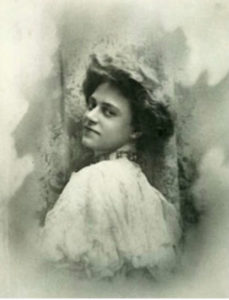
Grace N. Johnson
*Grace Nail Johnson was born on this date in 1885. She was a Black activist and patron of the arts.
Grace Elizabeth Nail was born in New London, Connecticut. She was the second child of real estate developer John Bennett Nail and Mary Frances Robinson. By the time she was born, the Nails had already become prominent members of the Black Bourgeoisie of New York City. While the family was very involved with the Harlem community, they lived in Brooklyn, where she would live for all her early life.
The Nail family business began with a restaurant and hotel in New York City, later opening another similar business in Washington, D.C. Eventually, the Nails' business ventures expanded into real estate. By the time her father died, they owned five apartment complexes in Harlem. With their influence, the Nails opened Harlem real estate to many blacks, which would drive the Harlem Renaissance in the 1920s. Her family were early members of the NAACP and participated in many artistic and intellectual circles in and out of Harlem. Those circles included prominent figures such as Frederick Douglass and Booker T. Washington. On February 3, 1910, she married composer James Weldon Johnson.
Nail Johnson was a hostess, mentor, teacher, and activist in various civil rights causes of the era. She was well known for hosting the Black political and artistic elites of the time and organizing events centered around popular Harlem artists. Some significant organizations she worked in were the Anti-Lynching Crusaders, the Circle for Negro Relief, the Heterodoxy Club, and the American Women's Voluntary Services. She is also credited as the founder of the NAACP Junior League, organized in 1929. Johnson and her husband were also especially active in promoting anti-lynching legislation.
On July 17, 1917, she, her husband, and her brother participated in the Negro Silent Protest Parade. The parade occurred on 5th Avenue, just one block from the Nail family restaurant. She also became politically involved outside of New York. An American novelist, Nella Larsen, once recalled traveling with Grace Nail Johnson through southern states in 1932. The two of them passed as white patrons at a restaurant in Tennessee as a political stunt. Her continued political activism eventually led to an event in 1941 in which First Lady Eleanor Roosevelt invited her, Mary McLeod Bethune, and Numa P. G. Adams to the White House to discuss the current state of race politics.
Later, during World War II (1942), Johnson publicly resigned from the New York American Women's Voluntary Services committee because of racial discrimination she and others experienced in their work projects. One year later, she recalled the experience as she spoke on an NBC radio program about equal pay. On that program, she stated, "We should not have two wage scales for the same job--one for men and one for women, one for Negroes and one for whites."
In addition to being a political activist, Johnson was also part of a network of prominent Harlem women who fostered the development of Black children’s literature. This connection began with her parents' patronage of Harlem artists and deepened with her marriage to James Weldon Johnson, a writer. Even after her husband’s death, Johnson continued participating in discussion circles of Harlem literature. Of the many literary circles she participated in, one group that focused entirely on children's fiction included herself, Langston Hughes, Ellen Tarry, and Charlemae Hill Rollins.
Notably, she often had a unique voice compared to younger circle members. For example, she praised the children’s book The Snowy Day by Ezra Jack Keats, while the other documented group members criticized it. While they found issues with the book's portrayal of a young African American boy, she wrote that it “fits the time” and that “James Weldon Johnson would have loved The Snowy Day.” Although the extent of her involvement in children's literature is unclear, she has been referred to by scholars of the subject as “the unsung hero of children’s literature."
One of the greatest legacies she left behind is the large collection of papers she gathered and preserved. Throughout her life, Grace Nail Johnson kept a record of newspaper clippings that mentioned herself, her husband, their work, or events significant to the history of Harlem. In 1941 she worked with Carl Van Vechten to create the James Weldon Johnson Memorial Collection of American Negro Arts and Letters at the Beinecke Rare Book and Manuscript Library of Yale University. At the time of its creation, the collection was one of the only of its kind. A scrapbook of her brother John E. Nail's work and her papers were later added to the collection. Johnson continued to seek out and receive additional pieces of literature from other Harlem authors to add to the collection until her death on November 1, 1976. The collection has been a valuable resource for researching Harlem Renaissance literature and history.